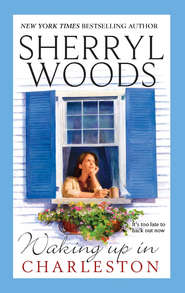По всем вопросам обращайтесь на: info@litportal.ru
(©) 2003-2024.
✖
The Backup Plan
Автор
Год написания книги
2019
Настройки чтения
Размер шрифта
Высота строк
Поля
I can’t tell you how delighted I am to have The Backup Plan back in print. Not only was it my hundredth book, but it’s set in one of my favorite cities, Charleston, South Carolina, and starts a trilogy set in the South Carolina low country. It’s followed by Flirting with Disaster, which will be reissued later this year, and by Waking Up in Charleston.
You may be reading The Backup Plan in the middle of winter, and if that’s the case, I think you can trust Dinah Davis and Cordell Beaufort to stir up plenty of heat for you. From the moment I met them, they were steaming up my reading glasses as I typed.
Dinah’s a woman at a crossroads of her life, an intrepid foreign correspondent who’s been through too much and is very close to coming unglued. Cord is one of those laid-back bad boys we all dream about, but at his core he’s one of the genuine good guys. For Dinah, he may turn out to be her greatest risk ever, but he also promises to offer her the greatest reward of her life.
I hope you enjoy traveling to the low country with these two wonderful characters and will be anxiously awaiting more when Flirting with Disaster and Waking Up in Charleston are reissued.
All good wishes,
1
Her producer was tiptoeing around bad news. Dinah could see it in his eyes, hear it in his voice. After a decade of working in TV journalism with basically the same news team, she’d learned to recognize the signs.
Ray Mitchell was an outstanding producer, but he was lousy at subtle communication. Barking out directives was more his style. In fact, he belonged in another era, one of hard-drinking, cigar-smoking journalists and legendary war correspondents such as Ernie Pyle, Edward R. Murrow, Walter Cronkite and Dan Rather. They had brought battle coverage to new heights through shrewd performances. Watching Ray try to sheepishly soft-pedal whatever was on his mind was painful.
“What is it you’re trying so hard not to tell me?” she finally asked. “Is there something wrong with the piece I just turned in? It was a great interview.”
The pictures had been good, too, even if they weren’t as great as her previous cameraman’s would have been. But they were better than adequate.
Ray looked even more uncomfortable. “For somebody else, maybe,” he said with the familiar bluntness Dinah had always respected. “Not for you.”
On some level Dinah had been anticipating that comment. Still, she stared at him in shock. She wasn’t used to being even gently criticized for her work. The many years of accolades from her colleagues in the field and her superiors in their lofty New York towers made her expect praise. “What are you saying, Ray? Just spit it out.”
It was hot as blazes without air-conditioning in their makeshift newsroom, but Dinah knew that wasn’t the reason Ray needed to mop his round face with a handkerchief. He was so nervous that he looked miserable.
“Okay,” he said eventually. “You want the truth, here it is. You’ve lost your edge, Dinah. It’s understandable, given what happened a few months ago, but—”
Dinah tuned him out. Nobody ever mentioned the incident in front of her anymore. Not being able to talk about what had happened had been difficult for Dinah. Whenever she brought up the subject of that tragic nightmare, everyone’s eyes filled with pity as they murmured soothing nonsense and then cut off any further discussion.
That was partly because for weeks after the episode, Dinah had listened dry-eyed to everyone’s sympathy or made the kind of impersonal, caustic comments that all reporters made to keep their fears and grief at bay. They’d all taken their cues from her and had stopped discussing it. Now that she was finally able and eager to talk, their grieving was over and they didn’t want to be reminded that only through the grace of God had they not been on that deadly roadside. They no longer wanted to face their own mortality, or consider the risks inherent in this hellish assignment.
War correspondents were a special breed of journalists. The burnout rate was high for those who favored ambition over self-preservation.
“They’re asking questions in New York,” Ray continued.
That got her attention. “What kind of questions?” she asked testily. She’d grown complacent about the network’s hands-off approach to most of her pieces.
“They want to know whether you shouldn’t be taking a break, you know, just until you’ve had time to deal with what happened,” Ray said carefully. “You’re due some time off, anyway. More than a little, in fact. No one can remember the last time you took a vacation.”
Her stomach sank. A break was the last thing she needed. Work defined her. It motivated her to get out of bed in the morning. Turning in one supposedly sub-par interview when she’d given them dozens of prizewinners and nearly single-handedly earned the upstart cable news operation industry-wide respect deserved better than this treatment.
“I don’t need time off,” she said flatly. “I need to keep working.”
“How about a different assignment then?” Ray suggested. “Go to the London bureau for a while. Or Paris. Maybe even Miami. Now there’s a cushy one. Sunshine, palm trees and beaches.”
The image didn’t impress her. In the days immediately following what she still thought of as the “incident,” she’d considered quitting. But then she had realized that this was the only work she truly wanted to do. If it was harder, if she was scared every minute of every day, she was determined to overcome her fears. Now when she walked out of the hotel and into uncertainty every single day she considered her actions a personal tribute to the bravery of every correspondent who’d died while making sure that the world had a close-up view of the action.
“Come on, Ray. I’d be wasted in London or Paris. And you can forget about Miami,” she said with a shudder. “Covering war is what I do. And I do it better than ninety percent of the other reporters around.”
He looked at her with concern. “Until recently you were better than all of them.”
“And I will be again,” she insisted. “I just need a little time to …” What? Adjust? Not possible. Go on? Maybe. That’s what she was aiming for, one day at a time.
“Wouldn’t it be better to take that time someplace else?” he asked, trying one more time. “You’ve paid your dues, Dinah. You were due for a break before any of this happened. We talked about it, remember? I thought you were planning to go home, see your folks. Why not do it now? People rotate in and out of here all the time because nobody can live like this without getting their heads all screwed up. You’re not Superman. Why should you be any different?”
Because if she left now, everyone would see it as a sign of weakness, she thought. They would think she’d folded in a crisis and she wouldn’t allow anyone to see her that way. She was used to commanding respect.
Ray went right on. “I’d think you’d want a chance to see your family, do something normal for a while. Weren’t you looking forward to that?”
She had been, but not any longer. Things had changed too drastically. Working was what she needed to do if she were to remain sane and maintain her self-respect. She wasn’t sure she wanted to go home until everyone there had forgotten whatever they’d heard about her. She didn’t want to face all the questions back home just yet.
“Not now, dammit!” she said more sharply than she’d intended. “Forget it, Ray! I’m not going anywhere.” Alarm flared in Ray’s eyes. “This is what I’m talking about. You never used to snap, no matter how tense things got. You’re not yourself, Dinah, and I’m worried about you. I don’t want you coming unglued on air one of these days.”
She stared at him with sudden understanding. “That’s why I’ve done so few live shots lately, isn’t it? You’re afraid I’ll lose it.”
He regarded her with obvious discomfort. “It’s a chance I’d rather not take,” he admitted. “For your sake, not the network’s. I don’t give a damn what they think.”
She suspected that much was true. Ray had always been an ardent advocate for his team. He babied his reporters and cameramen as if they were his own kids. He’d go to bat for them with the powers-that-be in New York whether it was in his own best interests or not.
Because she had faith in his motives, she deliberately forced herself to calm down before she replied. “You’re being an old fussbudget,” she accused lightly. “I’m fine. If that changes, if I think I can’t do the job anymore, I swear I’ll let you know.”
Ray looked doubtful. “You’ve never known your own limits, because you never had to set any for yourself. You did whatever it took.”
Listening to him, she felt guilty. If Ray knew what a struggle it was for her to walk out of the hotel on every assignment, he’d be even more adamant about sending her away.
“I still do whatever it takes,” she told him, knowing that much was true. It just cost her more. “Come on, Ray. Cut me some slack here.”
“That’s just it. I have been cutting you a whole lot of slack.”
This was another shock, and it was more humiliating than the first. She regarded him with dismay. “What are you talking about? Are you saying I’m not carrying my weight?”
He regarded her with discomfort. “Okay, here’s the plain, unvarnished truth. And listen up, because you need to hear this. We’ve missed some stories, Dinah. Things that never should have gotten past us. Everyone up top has been ignoring it, because of the circumstances, but they’re getting impatient back home. It’s been a few months now. I’m not going to be able to hold them off much longer. The decision of whether you stay or go could be taken out of my hands … and yours.”
Dinah tried to think of stories they’d missed. She hadn’t paid that much attention to the competition and what they were reporting. With her contacts, she’d always been so far out in front, she hadn’t needed to. Was it possible that the other journalists were taking advantage of her distraction? Maybe so, she admitted truthfully.
“Okay, that stops now,” she promised Ray, filled with a renewed sense of determination. “I’ll be back on top of things from here on out. If I’m not …”
He met her gaze. “If you’re not, you’re going home, Dinah,” he said flatly. “Whether it’s what you want or not.”
The unflinching warning shook her as nothing had in weeks. “It won’t come to that,” she said grimly.
All she had to do was push those godawful images out of her head and focus on the here and now. She’d put aside horror in order to do her job a thousand times through the years.
She could do it again, she told herself staunchly. She was going to get it together and come back better than ever. She owed it to the viewers who counted on her to tell an honest, objective story on the nightly news. She owed it to the network that had given her a chance when she was barely out of journalism school.
Most of all, though, she owed it to herself. Without this job, who the hell was she?
Two weeks after her conversation with Ray, the sound of her cell phone ringing at 4:00 a.m. sent Dinah diving under her hotel bed. It wasn’t the first time she’d become skittish over nothing, but the incidents were becoming more frequent and more dramatic.











